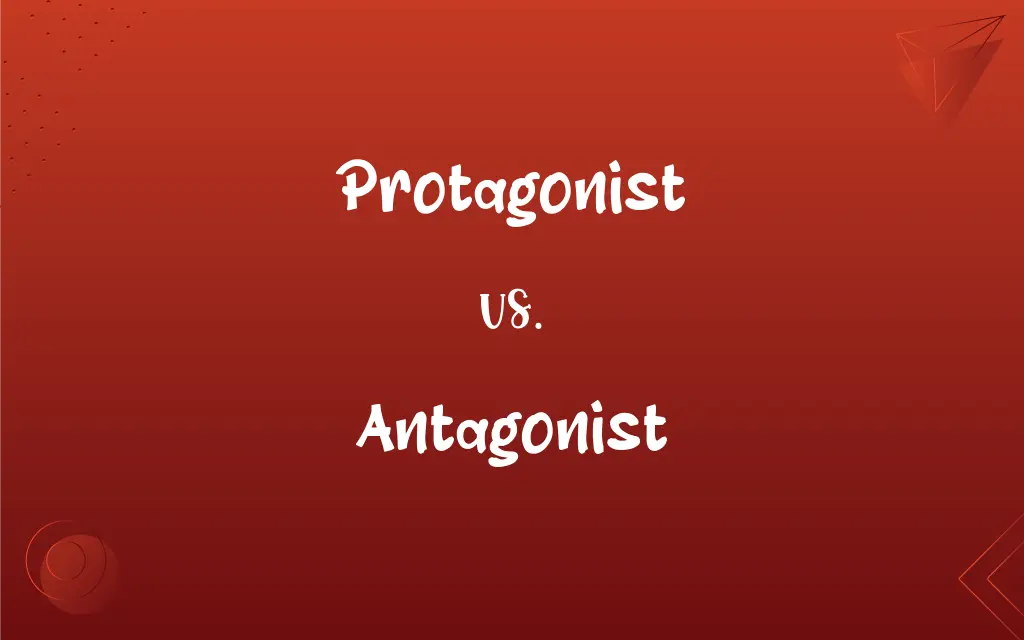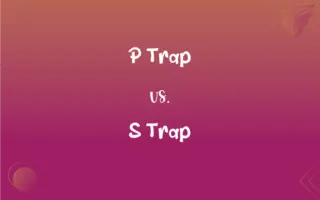Protagonist vs. Antagonist: What's the Difference?
Edited by Aimie Carlson || By Harlon Moss || Updated on October 14, 2023
The protagonist is the main character or hero of a story, while the antagonist opposes the protagonist.

Key Differences
The protagonist is often regarded as the central character or the hero in a narrative, the one readers are meant to identify or empathize with. On the other hand, the antagonist is a character, group, or concept that stands in opposition to the protagonist, presenting obstacles or challenges.
In literature, a protagonist usually undergoes significant change, growth, or development. They drive the plot forward with their goals and actions. In contrast, the antagonist often serves as the catalyst for this change, by posing challenges or conflicts that the protagonist must overcome.
Notably, a protagonist isn't always "good" or moral, just as an antagonist isn't always "evil." The terms refer more to their narrative roles than moral standings. It's their relative positions in the storyline that define them.
While readers typically root for the protagonist, hoping for their success, they might have mixed feelings or even disdain for the antagonist. However, a well-rounded antagonist can add depth and intrigue to the story, making readers question their own perceptions.
It's worth noting that in some narratives, a character can be both a protagonist and an antagonist. This usually occurs in stories that delve deep into internal conflicts, where the protagonist's own flaws or fears act against them.
ADVERTISEMENT
Comparison Chart
Role in Narrative
Central character driving the plot.
Opposes or challenges the protagonist.
Emotional Connection
Elicits empathy or identification from the reader.
Often seen as an obstacle or enemy.
Character Development
Typically undergoes growth or change.
Might remain constant to contrast the protagonist.
Moral Standing
Not necessarily good; depends on the narrative.
Not necessarily evil; depends on the narrative.
Narrative Focus
Story usually revolves around them.
Exists in relation to the protagonist's journey.
ADVERTISEMENT
Protagonist and Antagonist Definitions
Protagonist
Central character of a story.
Harry Potter is the protagonist of his series.
Antagonist
Presents challenges or conflicts for the protagonist.
The antagonist set traps to hinder the hero's progress.
Protagonist
Figure who undergoes change or growth.
The protagonist learned valuable lessons on her journey.
Antagonist
Character or force opposing the protagonist.
Voldemort is the main antagonist in the Harry Potter series.
Protagonist
Character driving the main plot.
The protagonist's quest was to find the hidden treasure.
Antagonist
Not always an individual; can be a group or concept.
Society itself can sometimes be the antagonist.
Protagonist
Might face internal or external conflicts.
The protagonist struggled with his own doubts.
Antagonist
Often contrasts the protagonist's values or goals.
The antagonist's beliefs were in direct opposition to the protagonist's.
Protagonist
Often the hero or the character readers root for.
The audience cheered for the protagonist as he faced challenges.
Antagonist
Can be a well-rounded character with their motivations.
The antagonist believed he was doing the right thing.
Protagonist
The main character in a work of fiction, as a play, film, or novel.
Antagonist
One who opposes and contends against another; an adversary.
Protagonist
In ancient Greek drama, the first actor to engage in dialogue with the chorus, in later dramas playing the main character and some minor characters as well.
Antagonist
The principal character in opposition to the protagonist or hero of a narrative or drama.
FAQs
Can a story have multiple protagonists?
Yes, some stories have multiple central characters or protagonists.
Which character usually opposes the main character?
The antagonist.
Can a protagonist be flawed or have negative traits?
Yes, protagonists can be complex and have both strengths and flaws.
Who is typically the main character in a story?
The protagonist.
Is the antagonist always a villain?
No, an antagonist is simply someone who opposes the protagonist, not necessarily evil.
Can an antagonist be a concept rather than a person?
Yes, concepts like society, nature, or inner demons can be antagonists.
Can a character be both a protagonist and an antagonist?
Yes, especially in stories focused on internal conflicts.
Do all stories require an antagonist?
No, some stories focus on internal conflicts or external challenges without a clear antagonist.
Can the antagonist change over the course of a story?
Yes, as the story evolves, different characters or forces can serve as the antagonist.
Can an antagonist have redeeming qualities?
Absolutely. Many great stories feature complex antagonists with both good and bad traits.
Is the protagonist always morally right?
No, protagonists can be morally gray or even antiheroes.
Is the protagonist's journey shaped by the antagonist?
Often, yes. The antagonist's actions or beliefs can drive the protagonist's growth or journey.
Do readers always root for the protagonist?
Typically, but not always. It depends on the character and the story.
Can a protagonist be passive?
While protagonists typically drive the story, some narratives might feature a more passive protagonist.
Are protagonists usually dynamic (changing) characters?
Often, yes. Protagonists typically undergo some form of growth or change.
Do all stories have clear protagonists and antagonists?
No, some narratives blur these roles or focus on ensemble casts without clear protagonists/antagonists.
Can the roles of protagonists and antagonists switch in a story?
Yes, roles can shift based on character development and plot twists.
Is the antagonist's role only to create conflict?
While they often create conflict, antagonists can also add depth and perspective to a story.
Can a story's environment act as an antagonist?
Yes, elements like harsh nature or societal pressures can be antagonistic forces.
Is it essential for an antagonist to be defeated?
Not always. The resolution can vary based on the story's theme and message.
About Author
Written by
Harlon MossHarlon is a seasoned quality moderator and accomplished content writer for Difference Wiki. An alumnus of the prestigious University of California, he earned his degree in Computer Science. Leveraging his academic background, Harlon brings a meticulous and informed perspective to his work, ensuring content accuracy and excellence.
Edited by
Aimie CarlsonAimie Carlson, holding a master's degree in English literature, is a fervent English language enthusiast. She lends her writing talents to Difference Wiki, a prominent website that specializes in comparisons, offering readers insightful analyses that both captivate and inform.































































